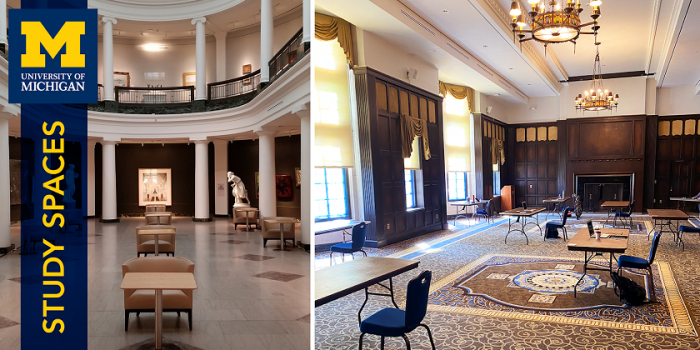
While preparing for the fall term under the COVID-19 pandemic, the university recognized that the student experience on campus in the 2020–21 academic year would be very different than a regular term at U-M. To support students on campus, the university launched a new web-based space reservation system and app for the Ann Arbor campus called Study Spaces at U-M.
A cross-unit team, led by the Provost’s Office, Information and Technology Services (ITS), the College of Engineering (CoE), and the University Library considered options for addressing this need and found that a tool already in use by the Library (LibCal) could be expanded for broader campus use quickly.
Students are already using Study Spaces at U-M this term to better plan their time on campus. The tool helps students find and reserve designated individual study spaces, computer stations, a space to take a remote class, or just a dedicated quiet touchdown spot between classes.
The system currently has over 1,400 individual spaces that can be reserved on North Campus and Central Campus. All individual study spaces are socially distanced and have disinfecting materials available to align with public health safety requirements.
Unique spaces offer variety
Students can reserve traditional study spaces and computer stations through the Study Spaces at U-M tool, as well as spaces that are unique and not usually used as study space. The Museum of Art created an inviting study space in the iconic Lizzie and Jonathan Tisch Apse. The Michigan Union and Palmer Commons similarly are making meeting rooms and event facilities available for individual study through the site. The College of Literature Science and the Arts is making a number of small classrooms not being used this term for classes available to students.
“ITS is working with our campus partners in establishing processes and procedures to administer the tool, cover vendor relations, and assist in setting up new Study Spaces across campus,” said Janet Przybylski, ITS service manager for Study Spaces. “In addition, we’ve established a Community of Practice with representatives from all participating schools, colleges, and units that are currently providing study spaces for this initiative. The Study Spaces COP has met regularly to share best practices and collaborate to promote use of the tool.”
If you are interested in adding your school, college, or unit to Study Spaces, or to learn more about the spaces available and the tool, go to studyspaces.umich.edu.
